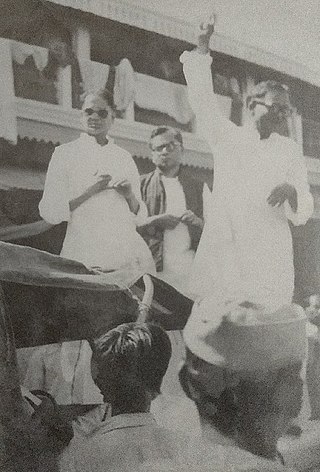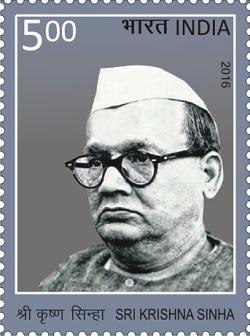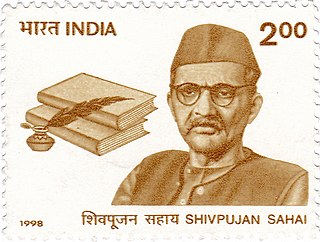
Jayaprakash Narayan Srivastava, also known as JP and Lok Nayak, was an Indian politician, theorist and independence activist. He is mainly remembered for leading the mid-1970s opposition against Prime Minister Indira Gandhi and calling for her overthrow in a "total revolution". In 1999, Narayan was posthumously awarded the Bharat Ratna, India's highest civilian award, in recognition of his social service. His other awards include the Magsaysay award for public service in 1965.

Rajendra Prasad was an Indian politician, lawyer, journalist and scholar who served as the first president of India from 1952 to 1962. He joined the Indian National Congress during the Indian independence movement and became a major leader from the region of Bihar. A supporter of Mahatma Gandhi, Prasad was imprisoned by British authorities during the Salt Satyagraha of 1930 and the Quit India movement of 1942. After the constituent assembly 1946 elections, Prasad served as 1st Minister of Food and Agriculture in the central government from 1947 to 1948. Upon independence in 1947, Prasad was elected as President of the Constituent Assembly of India, which prepared the Constitution of India and which served as its provisional Parliament.

The Congress Socialist Party (CSP) was a socialist caucus within the Indian National Congress. It was founded in 1934 by Congress members who rejected what they saw as the anti-rational mysticism of Gandhi as well as the sectarian attitude of the Communist Party of India towards the Congress. Influenced by Fabianism as well as Marxism-Leninism, the CSP included advocates of armed struggle or sabotage (such as Yusuf Meherally, Jayaprakash Narayan, and Basawon Singh as well as those who insisted upon Ahimsa or Nonviolent resistance. The CSP advocated decentralized socialism in which co-operatives, trade unions, independent farmers, and local authorities would hold a substantial share of the economic power.

Gandhi Maidan is a historic ground in Patna, near the banks of the Ganges River, in Bihar, India. The Golghar falls to its west. During the period of 1824–1833, under British rule, it was used as a golf course and horse racing track and was called Patna Lawns. It is spread across 60 acres of land. It has a great political significance as well.

The History of Bihar is one of the most varied in India. Bihar consists of three distinct regions, each has its own distinct history and culture. They are Magadha, Mithila and Bhojpur.Chirand, on the northern bank of the Ganga River, in Saran district, has an archaeological record dating from the Neolithic age. Regions of Bihar—such as Magadha, Mithila and Anga—are mentioned in religious texts and epics of ancient India. Mithila is believed to be the centre of Indian power in the Later Vedic period. Mithila first gained prominence after the establishment of the ancient Videha Kingdom. The kings of the Videha were called Janakas. A daughter of one of the Janaks of Mithila, Sita, is mentioned as consort of Lord Rama in the Hindu epic Ramayana. The kingdom later became incorporated into the Vajjika League which had its capital in the city of Vaishali, which is also in Mithila.

Shri Krishna Singh (Sinha) (21 October 1887 – 31 January 1961), also known as Shri Babu, was the first chief minister of the Indian state of Bihar (1946–61). Except for the period of World War II, Sinha was the chief minister of Bihar from the time of the first Congress Ministry in 1937 until his death in 1961. Along with the Desh Ratna Rajendra Prasad and Bihar Vibhuti Anugrah Narayan Sinha (A.N. Sinha), Sinha is regarded among the architects of modern Bihar. He also led the Dalit entry into the Baidyanath Dham temple (Vaidyanath Temple, Deoghar). He was the first chief minister in the country to abolish the zamindari system. He underwent terms of imprisonment for a total of about eight years in British India. Sinha's mass meetings brought many people to hear him. He was known as Bihar Kesari for his "lionlike roars" in public speaking. His close friend and Gandhian Bihar Vibhuti A.N. Sinha in his essay Mere Shri Babu wrote that, "Since 1921, the History of Bihar has been the history of the life of Shri Babu". The 'Bihar Kesari' never visited his constituency to ask for votes as he believed that his work will speak for him.

Krishna Ballabh Sahay, popularly known as K. B. Sahay, was an Indian freedom fighter, who after Indian independence became the revenue minister of Bihar and then the fourth Chief Minister of unified Bihar.

Satyendra Narayan Sinha was an Indian politician and statesman, participant in the Indian independence movement, a leading light of Jaya Prakash Narayan's ‘complete revolution’ movement during the Emergency and a former Chief Minister of Bihar. Affectionately called Chhote Saheb, he was also a seven-time Member of Parliament from the Aurangabad constituency, a three-term Member of the Bihar Legislative Assembly, and a Member of the Bihar Legislative Council once. Regarded to be one of India's most influential regional people of the time, his reputation was synonymous with being a strict disciplinarian and tough taskmaster.

Anugrah Narayan Sinha, known as Bihar Vibhuti, was an Indian nationalist statesman, participant in Champaran Satyagraha, Gandhian & one of the architects of modern Bihar, who was the first Deputy Chief Minister and the Finance Minister of the Indian state of Bihar (1946–1957). He was also a Member of the Constituent Assembly of India, which was elected to write the Constitution of India and served in its first Parliament as an independent nation. He also held a range of portfolios including Labour, Local Self Government, Public Works, Supply & Price Control, Health and Agriculture. A.N. Sinha, affectionately called Anugrah Babu, was a close associate of Mahatma Gandhi during the freedom movement and worked with Bihar Kesari Sri Krishna Sinha to lead the Gandhian movement in Bihar. One of the leading nationalists in the Indian independence movement from Bihar after Dr Rajendra Prasad, he was elected as the Congress Party deputy leader in the state assembly to assume office as the first Deputy Chief Minister cum Finance Minister of independent Bihar, and re-elected when the Congress Party won Bihar's first general election with a massive mandate in 1952.

Acharya Shivpujan Sahay was a noted Hindi and Bhojpuri novelist, editor and prose writer. He contributed in pioneering modern trends in, as well as in fiction. His texts "Mata ka Anchal" also printed in CBSE Book. In the text Mata ka Anchal, he has shown a wonderful bond with mother. He also conferred him with Padma Bhushan award by the Government of India.

Kishori Sinha was an Indian politician, social activist, a lifelong advocate of women's empowerment and a former two-term Member of Parliament from the Vaishali constituency. She was married to the former Chief Minister of Bihar Satyendra Narayan Sinha, who was a seven-term Member of Parliament, from the constituency of Aurangabad. Her son Nikhil Kumar had served as the Governor of Kerala and Governor of Nagaland.
Bihar is a state located in the eastern part of India.
The politics of Bihar, an eastern state of India, is dominated by regional political parties. As of 2021, the main political groups are Rashtriya Janata Dal (RJD), Bharatiya Janata Party (BJP), Janata Dal (United) (JDU), Indian National Congress (INC), Left Front, Lok Janshakti Party (LJP), Hindustani Awam Morcha (HAM). There are also some smaller regional parties, including Samata Party, Hindustani Awam Morcha, Rashtriya Jan Jan Party, Rashtriya Lok Janata Dal, Jan Adhikar Party and Vikassheel Insaan Party, Lok Janshakti Party and Rashtriya Lok Janshakti Party, which play a vital role in politics of state. As of 2024, Bihar is currently ruled by NDA, after JDU break out from Mahagatbandhan coalition and returned to NDA fold.

General elections were held in British India between 28 October and late November 1926 to elect members of the Imperial Legislative Council and the Provincial Legislative Councils.

Ram Lakhan Singh Yadav, known with the honorific "Sher-e-Bihar", also known as Ramlakhan Babu, was an Indian freedom fighter, educationist, social reformer and politician. The half a century long political journey of Ramlakhan Babu, which started in post-independence era as a member of the Zilla Parishad in 1947, reached the pinnacle of becoming a Union Minister in the Central Government in 1994.He was elected to the 10th Lok Sabha, lower house of the Parliament of India from the Arrah, Bihar in 1991 as a member of the Janata Dal but joined the Congress in controversial circumstances which helped save Narasimha Rao Government in the 28 July 1993 no confidence vote. He was the Minister for Chemicals and Fertilizers in the Narasimha Rao Government.
Ram Narayan Singh often referred to as Babu Ram Narayan Singh (1885-1964) was a noted freedom fighter, social worker and politician from Hazaribagh.




















